- George Jones, 81, dies at Nashville hospital, public relations firm says
- He had been hospitalized since last week with fever and irregular blood pressure
- Jones had tumultuous life; years were marked by alcoholism
(CNN) -- George Jones, the country music legend whose graceful, evocative voice gave depth to some of the greatest songs in country music -- including "She Thinks I Still Care," "The Grand Tour" and "He Stopped Loving Her Today" -- has died, according to his public relations firm.
Jones, 81, died Friday at Vanderbilt Medical Center in Nashville, the public relations firm said. He had been hospitalized since April 18 with fever and irregular blood pressure.
Jones career was marked by a tumultuous marriage to Tammy Wynette and bouts with alcoholism that led to occasional concert cancellations. (One of his nicknames was "No-Show Jones.")
But there was no denying his talent. Waylon Jennings once wrote a song that said, "George might show up flyin' high, if George shows up at all / But he may be, unconsciously, the greatest of them all."
Jones, nicknamed "The Possum" for his resemblance to the animal, was born in 1931 in east Texas. His early life marked by poverty and a violent, alcoholic father. Young George taught himself to play guitar and by the time he was a teenager he was singing on the streets and in the clubs of Beaumont, Texas, not far from his birthplace of Saratoga.
After a quick marriage and service in the Marines, Jones was discovered by Starday Records co-owner Pappy Daily, who guided his early career. His first single, 1954's "No Money in This Deal," failed to chart, but 1955's "Why, Baby, Why" was a hit. By 1959, Jones had moved to Nashville and recorded his first No. 1, "White Lightning."
Though Jones' early hits, such as "Lightning," "The Race Is On" and "Root Beer," were in a high-powered, rockabilly mode, he found his biggest success as a crooner. The mid-'60s were marked by such songs as "Things Have Gone to Pieces" and "A Good Year for the Roses," which highlighted broken or thwarted romance and the kind of longing that suggests late, lonely nights in bars.
It was a life that Jones started knowing all too well.
His second marriage, to Shirley Corley, was marked by frequent benders. Jones recalled one that became legend: He had been drunk for several days and Corley hid the keys to all of their cars. However, he pointed out, she'd forgotten one vehicle: their lawnmower. They lived eight miles from a liquor store, but that didn't stop Jones.
"I imagine the top speed for that old mower was five miles per hour," he recalled. "It might have taken an hour and a half or more for me to get to the liquor store, but get there I did."
Jones and Corley divorced in 1968. A year later, he married Wynette, one of Nashville's biggest names. The two had a number of huge hits as a pair, but the strain of their marriage was indicated in song titles such as "We Can Make It" and "Loving You Can Never Be Better." (One of Wynette's singles was called "Kids Say the Darnedest Things.")
"By now, the couple's marriage was becoming a public soap opera, with their audience following each single as if they were news reports," wrote CMT.com in its Jones biography.
Wynette filed for divorce in 1973, reconsidered, and then filed again two years later. This time it stuck. However, though the pair were divorced, they continued to sing together for years afterwards. Wynette died in 1998.
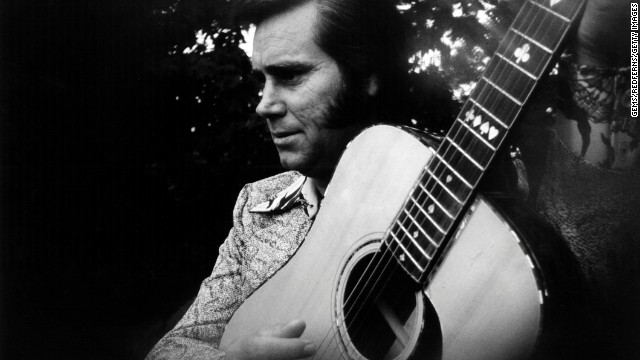 Country music legend George Jones died Friday, April 26, in Nashville, Tennessee. He was 81. Above: Jones poses for a portrait circa 1975.
Country music legend George Jones died Friday, April 26, in Nashville, Tennessee. He was 81. Above: Jones poses for a portrait circa 1975.
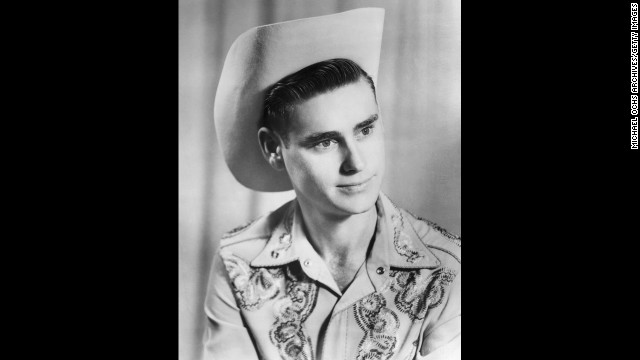 Jones poses for a portrait in Nashville circa 1956.
Jones poses for a portrait in Nashville circa 1956.
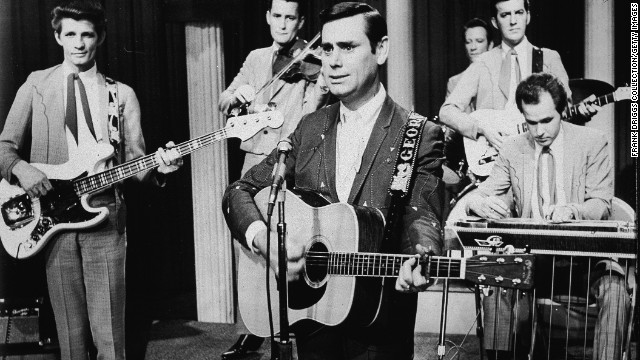 Jones performs with his band on stage for the film, 'From Nashville With Music,' in 1969.
Jones performs with his band on stage for the film, 'From Nashville With Music,' in 1969.
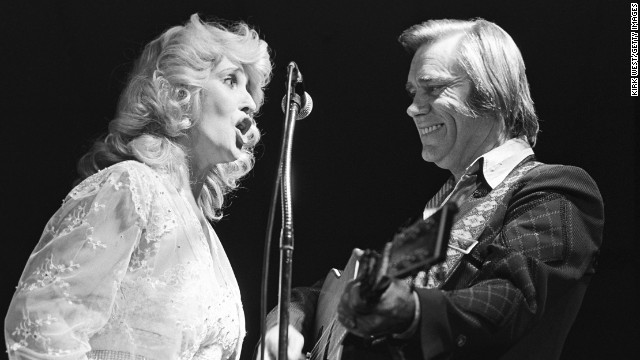 Country singer Tammy Wynette and Jones perform at Countryside Opry in Chicago in October 1980. Wynette and Jones were once married.
Country singer Tammy Wynette and Jones perform at Countryside Opry in Chicago in October 1980. Wynette and Jones were once married.
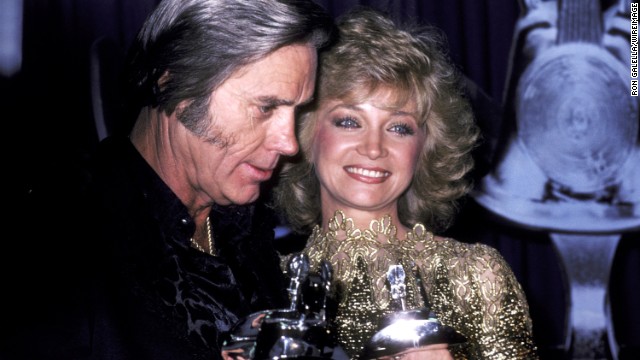 Jones and Barbara Mandrell pose during the 1991 Academy of Country Music Awards in Los Angeles.
Jones and Barbara Mandrell pose during the 1991 Academy of Country Music Awards in Los Angeles.
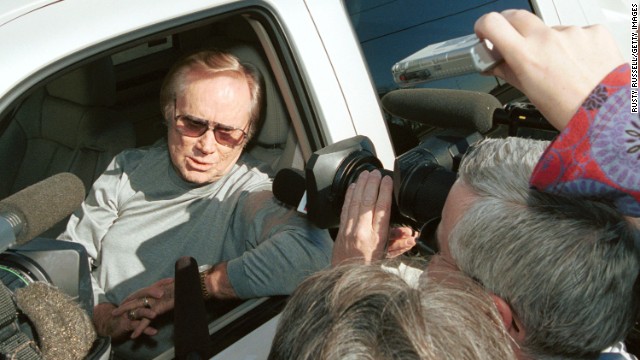 Jones talks with reporters in Nashville before greeting protesters who were rallying in front of WSM Radio studios against radio format changes in January 2002.
Jones talks with reporters in Nashville before greeting protesters who were rallying in front of WSM Radio studios against radio format changes in January 2002.
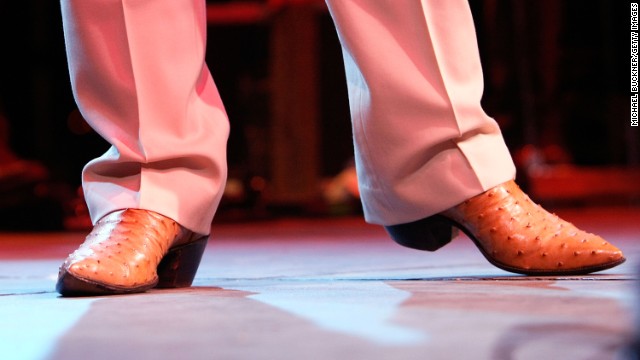 Jones performs during Stagecoach, California's Country Music Festival held at the Empire Polo Field in May 2008 in Indio, California.
Jones performs during Stagecoach, California's Country Music Festival held at the Empire Polo Field in May 2008 in Indio, California.
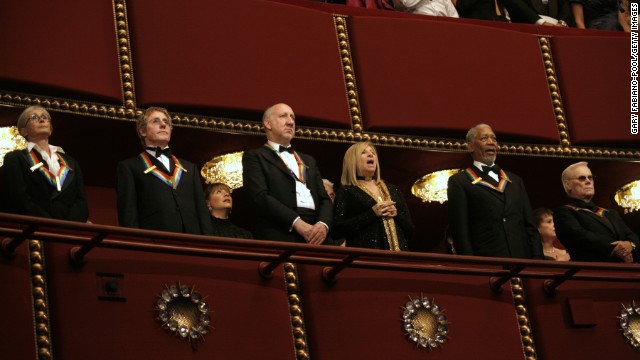 Twyla Tharp, left, Roger Daltrey, Pete Townshend, Barbra Streisand, Morgan Freeman and Jones stand as they are honored during the 2008 Kennedy Center Honors in Washington.
Twyla Tharp, left, Roger Daltrey, Pete Townshend, Barbra Streisand, Morgan Freeman and Jones stand as they are honored during the 2008 Kennedy Center Honors in Washington.